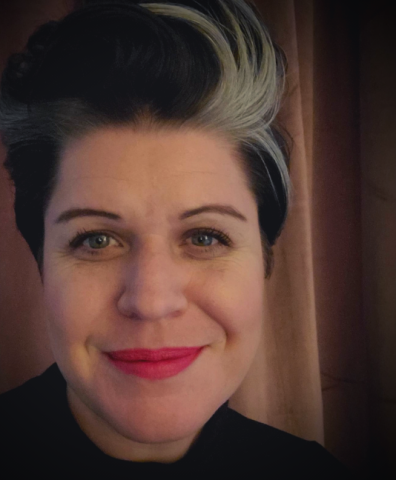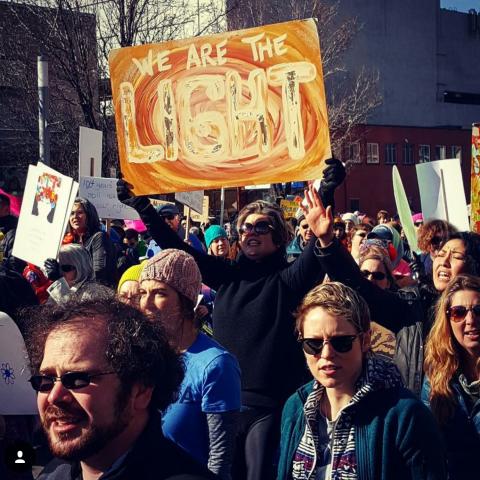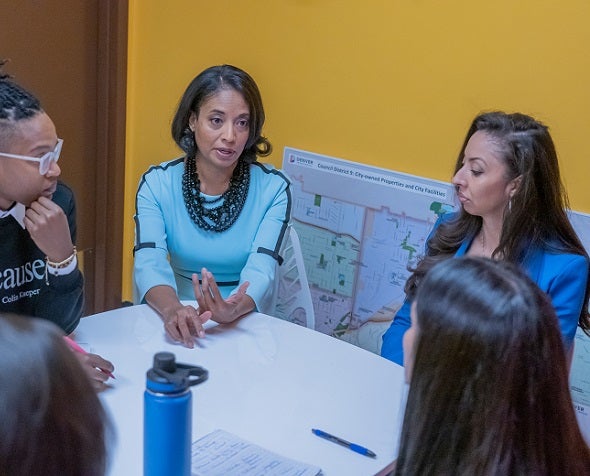The Future of Denver: Jami Duffy
At the end of 2020, University of Denver Advancement hosted a series of virtual fireside panels with the city of Denver’s movers and shakers, many of whom are DU alumni. The topic: how Denver can thrive during and after the COVID-19 pandemic. In this four-part series, the DU Newsroom chats with alumni from a variety of industries and sectors to examine the community’s strengths, weaknesses and solutions in the years ahead.
Jami Duffy (BA ’03) is executive director of Youth on Record (YOR), a nonprofit that designs and delivers music- and art-centered programming to primarily Black and Indigenous people of color (BIPOC) in Denver. Through education and art, YOR aims to provide the skills necessary for academic success, economic success, equity and liberation. A Denver native, Duffy earned a dual degree in political science and journalism studies before serving in the Peace Corps in Nicaragua. In December 2020, she spoke on a panel discussing the future of community involvement.
What are some of the greatest challenges Denver will face in the next five years? And what are some of the biggest opportunities for the city?
What we face as a nation, state and city is certainly overwhelming, and it’s hard to know which monster to tackle first. But without question, racial equity needs to be at the forefront of all our work. Undoing systems of oppression and white supremacy requires us to critically examine our current systems and to make the robust and sweeping changes that will create equitable access to opportunity for all people in our city.
Our city (and state) will need to engage in a massive redesign of our education systems to make up for the COVID learning losses and to develop the critical-thinking skills in our youth that will meet the needs of our uncertain future. We need to strongly consider assembling an education task force that will focus on year-round schooling, “cradle-to-career” support services and curriculum that matters. Youth on Record leans heavily on ethnic studies curriculum, the arts, poetry and creative writing as tools to engage our young people. If our children and youth see themselves, their stories and their cultural identities represented in [curricula], have the tools to become critical thinkers, writers and thought explorers, and have an outlet to express their traumas and triumphs via the arts, their engagement levels are bound to increase.
[Economically,] technical training in jobs of the future (clean energy, technology, food, nutrition, community building and the creative industries) deserves our attention and resources. Until the student debt crisis is mitigated, and until college is free for all Americans, we’re perpetuating a system of inequities and debt for BIPOC and low-income Americans.
This is a no-brainer, but we need to get through this pandemic with robust plans for public health awareness, vaccine distribution, COVID testing, contact tracing, and health and wellness services that promote and support healthy lifestyles and practices. We’ve paid little attention to health and wellness support, especially for BIPOC communities, and COVID prevention via healthy bodies and immune systems is a critical piece of the puzzle.
How do we work toward equitable and accessible education and employment in Denver?
If I had a magic wand, YOR’s hiring practices, which are rooted in racial and social equity, would be the norm — not the exception — for all Denver companies, including the city itself.
YOR takes all measures to ensure that community members from a variety of backgrounds and lived experiences have the opportunity to work for us. As such, we consider but do not base employment on education, traditional work experience or criminal records.
Denver has garnered national attention for its economic growth, yet many social issues persist. What would it look like for Denver to truly become a vanguard city? And what barriers prevent the city from reaching those opportunities?
I was in a yoga class a few years ago, and we were doing a balance pose. Everyone in the class was unstable and couldn’t hold the pose, and our reaction was to hunch down and get smaller. The yoga teacher stopped us and asked us to try again, but this time she told us to stand tall and stretch our arms as wide as they could go. And, like magic, we were all immediately stable in the pose. I think of this often as I run our organization. When we’re on shaky ground, we shouldn’t cower and get smaller. We should expand, be brave and try new things. That’s what we need right now. Bold leadership. Innovative solutions that come from the community. And a willingness to try things we’ve never done before.
I’d love to see us depoliticize things like education, economic opportunity, racial equity and COVID relief. Colorado perhaps has a better chance at this than most states. But there’s work to be done (and this means all of us). On the left, we need to retire “call-out culture” once and for all. This is standing in our way of progress and pushing people away. Yes, people need to be held accountable for white supremacy and misconduct; but we need to find new ways to bring people into conversations about what it’s going to take to move forward — together. On the right, there needs to be more willingness to admit the generational wrongdoings that plague our nation, and there needs to be more critical examination of the systems that perpetuate the power of a few. We can no longer afford to be in denial.
What role do we, as individuals, have in reaching that point?
This is a big one for me. We have to start to care about other people’s children as much as we care about our own. Many families have maintained their income, and their children have had access to the tools and technology they need to keep up with their studies during COVID. And while these families have struggles with managing new schedules and being home together during this time, they’re doing OK. [But] this is not the case for a majority of families and children. We need to start developing “whole communities” where your children and family (their needs, dreams and opportunities) matter to me as much as my own.












